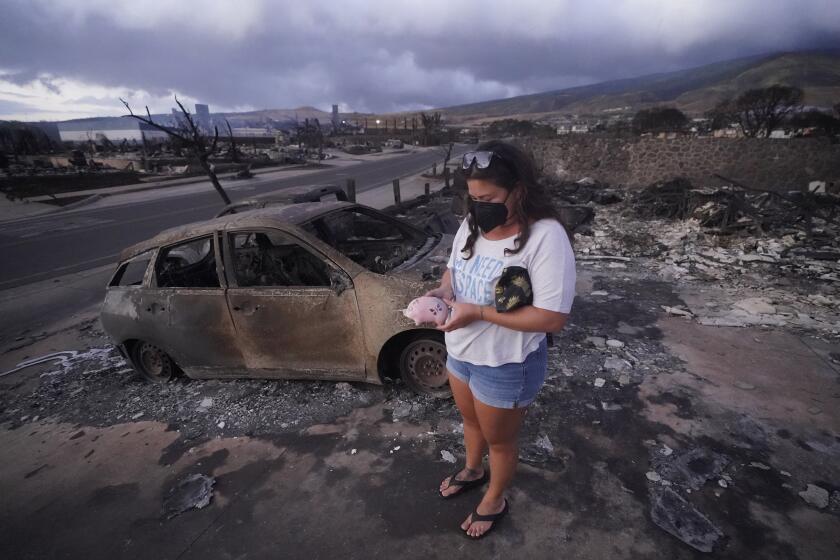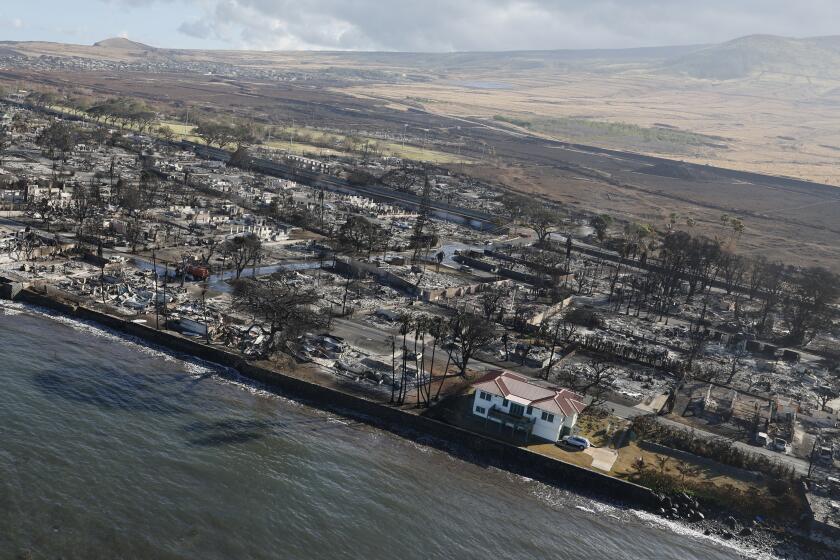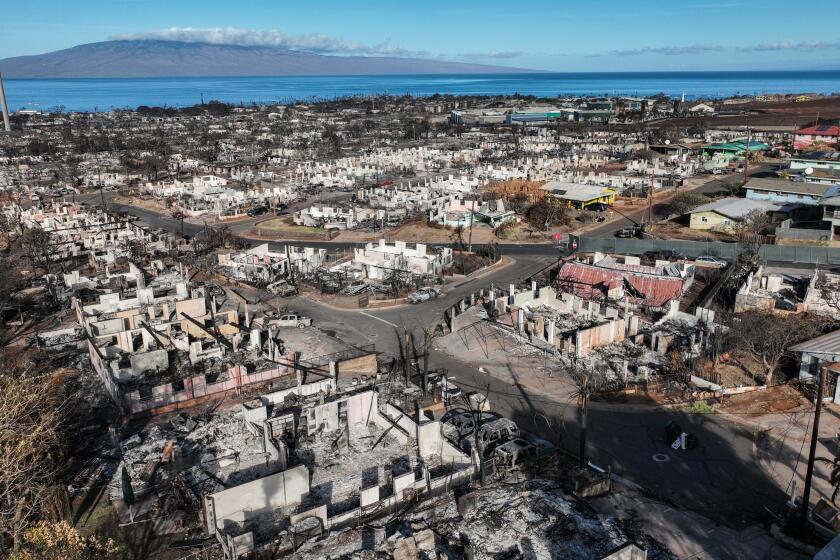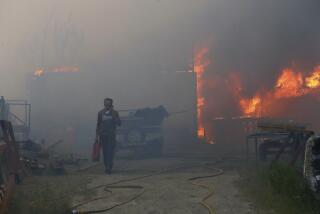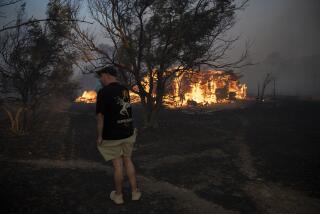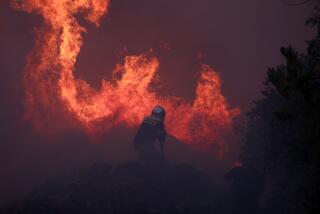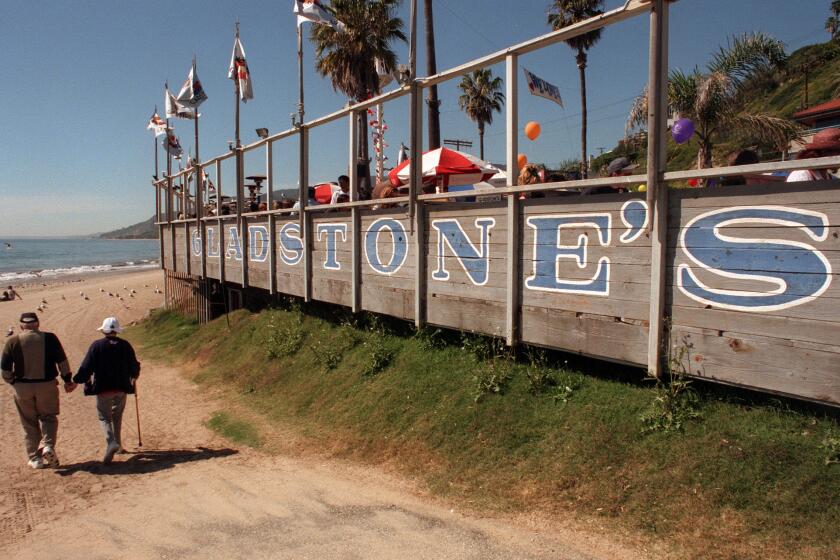Bodies of 18 people found in an area of a major wildfire in Greece
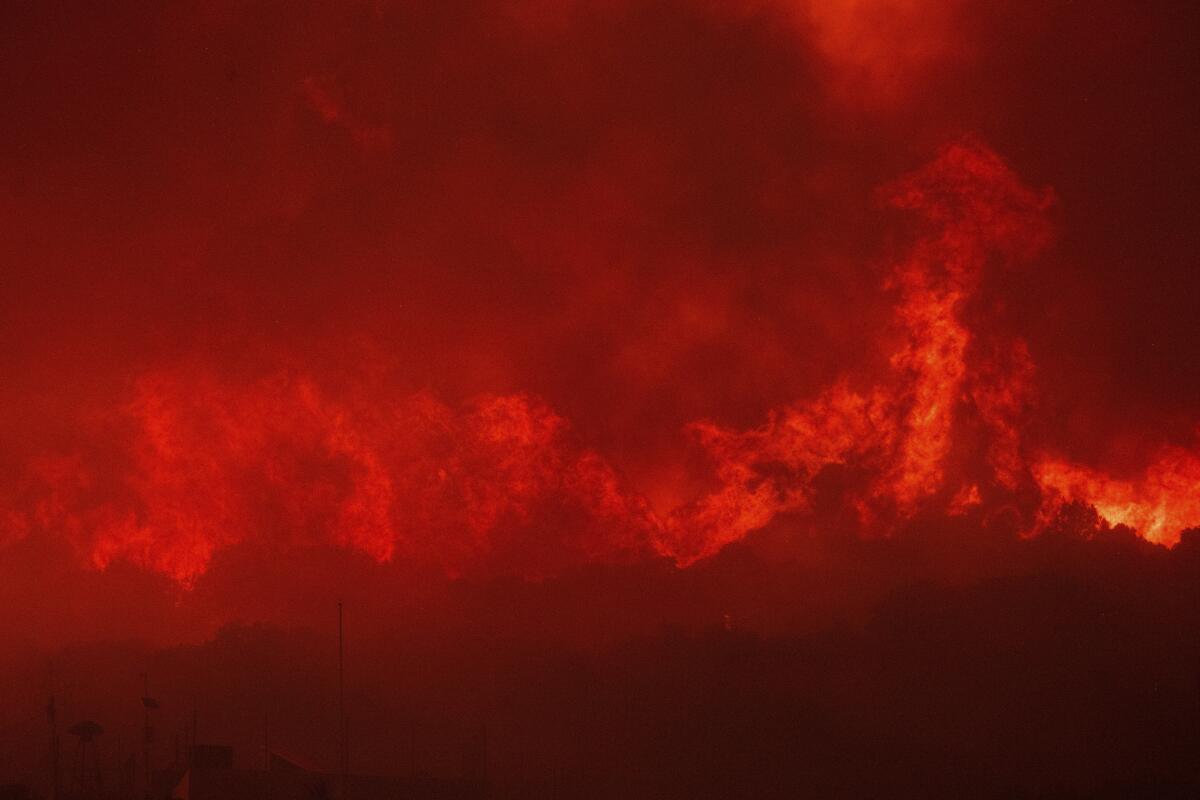
ALEXANDROUPOLIS, Greece — Firefighters scouring the area of a major wildfire burning out of control for a fourth day in northeastern Greece found the bodies of 18 people, authorities said Tuesday. They were examining whether the group might have been migrants who entered the country through the nearby border.
The discovery in the Avanta area of Alexandroupolis came as hundreds of firefighters battled dozens of wildfires, fanned by gale-force winds, across the country. On Monday, two people died and two firefighters were injured in fires in northern and central Greece.
With their hot, dry summers, Southern European countries are particularly prone to wildfires. Another major blaze was burning across Tenerife in Spain’s Canary Islands for a week, although no injuries or damage to homes was reported.
European Union officials have blamed climate change for the increasing frequency and intensity of wildfires in Europe, noting that 2022 was the second-worst year for wildfire damage on record, after 2017.
In Greece, police activated the country’s Disaster Victim Identification Team to identify the 18 bodies, which were found Tuesday near a shack, fire department spokesman Ioannis Artopios said in a televised statement.
“Given that there have been no reports of a missing person or missing residents from the surrounding areas, the possibility is being investigated that these are people who had entered the country illegally,” Artopios said.
Officials long knew of the risk of a major blaze, but a review of records and interviews shows there was not a fire evacuation plan for Lahaina.
Alexandroupolis lies near the border with Turkey, along a route often taken by people fleeing poverty and conflict in the Middle East, Asia and Africa and seeking to enter the European Union.
Avanta, like many nearby villages and settlements, had been under evacuation orders, with push alerts sent to cellphones in the area.
Overnight, a massive wall of flames raced through forests toward Alexandroupolis, prompting authorities to evacuate eight more villages and the city’s hospital. Flames turned the sky red as choking smoke and swirling flecks of ash filled the air.
About 65 of the hospital’s more than 100 patients were transported to a ferry docked in the city’s port, while others were taken to other hospitals in northern Greece. The ferry later set sail with more than 20 of the patients for the port town of Kavala, where they were to be transferred to another hospital.
Greece’s migration minister says refugees recognized by individual EU nations should be allowed to live anywhere in the bloc.
Deputy Health Minister Dimitris Vartzopoulos, speaking on Skai television, said smoke and ash in the air around the Alexandrouplolis hospital were the main reasons behind the decision to evacuate the facility.
The coast guard said patrol boats and private vessels evacuated 40 more people by sea from beach areas west of Alexandroupolis and were ferrying them to the city’s port.
In the northeastern Evros border region, a fire was burning through forest in a protected national park, with satellite imagery showing smoke from the blaze blanketing much of northern and western Greece.
Hundreds of patients, including infants and others in critical care, were evacuated at White Memorial Hospital in Boyle Heights after a power outage.
Fires broke out in several parts of the country during the day Tuesday, including in woodland northwest of Athens and an industrial area on the western fringes of the capital.
Small explosions resounded from the industrial area of Aspropyrgos as the flames reached warehouses and factories, while authorities shut down a highway and ordered the evacuation of nearby villages.
With firefighting forces stretched to the limit, Greece appealed for help from the European Union’s civil protection mechanism.
Five firefighting planes from Croatia, Germany and Sweden and a helicopter, 58 firefighters and nine water tanks from the Czech Republic were heading to Greece on Tuesday, and 56 Romanian firefighters and two water-dropping aircraft from Cyprus arrived Monday. French firefighters were also in Greece, helping tackle a blaze on the island of Evia on Monday.
Record heat. Raging fires. What are the solutions?
Get Boiling Point, our newsletter about climate change, the environment and building a more sustainable California.
You may occasionally receive promotional content from the Los Angeles Times.
“We are mobilizing actually almost one-third of the aircraft we have in the RescEU fleet,” EU spokesman Balazs Ujvari said.
The fire risk level for several regions, including the Athens area, was listed as “extreme” for a second day Tuesday. Authorities have banned public access to mountains and forests in those regions until at least Wednesday morning.
In Spain, firefighters battled to control a wildfire burning for a week on the popular tourist destination of Tenerife. It is estimated that the blaze, which has scorched 37,000 acres, has already burned one-third of Tenerife’s woodlands.
“The wildfire may be stabilized by tonight,” said Tenerife Gov. Rosa Davila, who nonetheless added that the blaze “is still active.”
A red-roofed house appears untouched amid the devastation of the Lahaina fire. Its owner says recent renovations may have helped make it fireproof.
More than 12,000 people were evacuated in the last week. Authorities said Tuesday that 1,500 have been able to return to their homes. Authorities have described the fire as the worst in decades on the Atlantic archipelago.
Large parts of Spain were under alert for wildfires because of a heat wave that sent temperatures spiking over 100 degrees. While Spain’s south often has extremely high temperatures, the country’s weather agency issued an alert for the northern Basque Country, where temperatures were forecast to reach 107 degrees Wednesday.
Greece’s deadliest wildfire killed 104 people in 2018 at a seaside resort near Athens where residents had not been warned to evacuate. Authorities have since erred on the side of caution, issuing swift mass evacuation orders whenever inhabited areas are under threat.
Last month, a wildfire on the resort island of Rhodes forced the evacuation of about 20,000 tourists. Days later, two air force pilots were killed when their water-dropping plane crashed while diving low to tackle a blaze on Evia.
President Biden flew to Hawaii to inspect wildfire damage in Maui while keeping tabs on havoc spurred by Tropical Storm Hilary in California.
In Italy, authorities evacuated 700 people from homes and a campsite on the Tuscan island of Elba after a fire broke out late Monday. In northwestern Turkey, authorities evacuated a small village in Canakkale province after a wildfire fanned by strong winds threatened homes. At least six helicopters and five water-dropping planes were deployed.
According to the Italian Society of Environmental Geology, more than 1,100 fires in Europe this summer have consumed about 1,100 square miles, well above an average of 724 fires a year recorded from 2006 to 2022. The fires have removed wooded areas capable of absorbing 2.5 million tons of carbon dioxide a year.
“When we add the fires in Canada, the United States, Africa, Asia and Australia to those in Europe, it seems that the situation is getting worse every year,″ said Antonello Fiore, president of the Italian Society of Environmental Geology.
More to Read
Sign up for Essential California
The most important California stories and recommendations in your inbox every morning.
You may occasionally receive promotional content from the Los Angeles Times.
